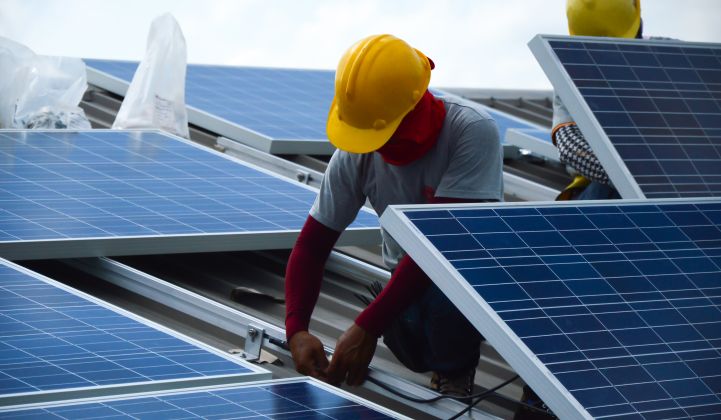Mosaic, a leading provider of solar loans in the U.S. residential market, will now offer an option of no payments for 12 months, joining other solar providers including SunPower, Sunrun and Vivint Solar in offering cut-rate deals amid the coronavirus pandemic.
All of those companies framed their bargains as a way to entice customers at a time when homeowners are concerned about finances and to boost sales amid a COVID-19-related slump. Unlike previously announced offerings, however, Mosaic’s new product — called PowerSwitch Zero — is permanent.
“Cash is tight for families right now,” acknowledged Mosaic CEO Billy Parish.
“We expect challenging economic times to continue for some time,” Parish told Greentech Media. “So, we think the PowerSwitch Zero product will bring value for years and could actually change the core financial product solutions for solar installation.”
Wood Mackenzie solar analyst Bryan White said the offering may pressure other loan competitors to follow suit; Mosaic now ranks third in the growing solar loan market behind Loanpal and Sunlight Financial. Mosaic offering free solar could also encourage installers and solar providers that have already introduced similar offers to extend their own deals.
“It is noteworthy, and perhaps a bit surprising, that this is a permanent product and not a promo product,” said White. “It certainly is poised to draw attention from potential solar customers — not to mention installer partners navigating the tough COVID-19 environment.”
Mosaic back to hiring after spring layoffs
Along with solar and solar-plus-storage, Mosaic’s new loan can finance standalone batteries and some home energy-efficiency projects. The new product covers Mosaic’s 10-, 15- and 20-year loans, adding one free year to those contract lengths. Mosaic Chief Lending Officer Erin Talbot said PowerSwitch Zero may also later be extended to the company’s 25-year offering as Mosaic assesses customer interest.
“I also want to give this product time in the market to get a sense of where…homeowners gravitate,” said Talbot. “[We] really want to see how battery attachment rates continue to increase and how homeowners do or don't take advantage of the optionality for other energy-efficient improvements.”
After seeing business slacken this spring and some layoffs, Parish said Mosaic has returned to hiring and pre-COVID-19 level demand.
The residential solar business took a nosedive as the coronavirus began spreading across the U.S. this spring, with homeowners tightening budgets and local governments shutting down installations for certain periods.
But in recent weeks many residential solar companies have reported that times are looking less dire, with solar installation largely deemed essential across many jurisdictions and U.S. residents coming to terms with the reality of a virus that will likely linger for the foreseeable future. In Q2 earnings reports released in the last several weeks, companies did not report residential installation drops as high as the 25 percent cuts that analysts projected for full-year 2020.
With the industry apparently rebounding, but still struggling to cope with persistent pandemic-related uncertainty, Mosaic's Talbot said the company would not be surprised to see other financiers follow suit with similar options.
“Will it be replicated? History would say yes,” she said.




